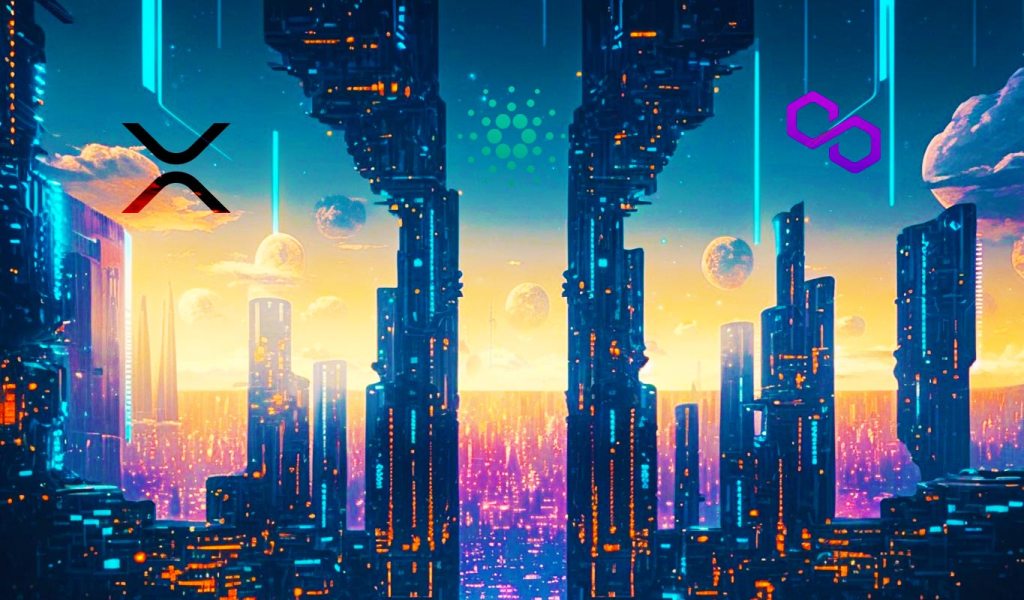
The content-sharing platform LimeWire is integrating a number of cryptocurrencies for customers to purchase a new token for the ecosystem. According to LimeWire, the latest crypto added to the payment methods to purchase the LimeWire Token (LMWR) is XRP. LimeWire added XRP after saying on Twitter they would do so if the idea got enough […]
The post File-Sharing Giant LimeWire Integrates Cardano, XRP, Polygon and Others As Payment for New Token Launch appeared first on The Daily Hodl.

LimeWire's retro music downloading game revives the look of its platform from the early 2000s and offers players the chance to win crypto.
A new game aimed at reviving the nostalgia of pirating music with the added bonus of crypto rewards has been launched by the former peer-to-peer file-sharing platform turned nonfungible token (NFT) marketplace LimeWire.
On April 13, the historic music-downloading platform, wildly popular in the early 2000s was revived and turned to Web3 in the form of a retro music-downloading game themed on the Microsoft Windows XP operating system.
Players need to enter their email addresses to play the browser-based game that prompts them to search for old early 2000s music and movies to download.
The simulation will provide a list of songs or movies from that era for players to choose to “download” within a time limit. Each simulated download that doesn’t contain a simulated “virus” will yield points to the player.

The scores are entered onto a leaderboard with the top players eligible to receive a distribution of LimeWire’s upcoming ERC-20 token, LMWR.
Related: Music NFTs are helping independent creators monetize and build a fanbase
LimeWire was re-launched in mid-2022 as an NFT marketplace with the aim to become a leading creator content marketplace and membership platform.
The original file-sharing platform was shut down in 2010 after a federal copyright infringement court case and the LimeWire NFT marketplace has no connection to the original platform or its team.
Cointelegraph contacted LimeWire for further details but did not receive an immediate response.
Hodler’s Digest, April 2-8: BTC white paper hidden on macOS, Binance loses AUS license and DOGE news

Video game developer Mark Venturelli launched a surprise attack on NFTs at a Brazilian gaming event, and Limewire is trending again following its NFT marketplace launch.
GameStop’s new NFT marketplace took home roughly $44,500 from transaction fees in the first 24 hours after it launched via a public beta on Monday.
GameStop NFT reportedly generated around $1.98 million worth of NFT sales on its first full day of business. As the platform charges a 2.25% fee on NFT sales, this equates to roughly $44,500 worth of fees.
While that sum may seem underwhelming, considering it would represent just 0.27% of GameStop’s daily revenue for 2021, it depends on your perspective. According to gaming news outlet Kotaku, GameStop had 4,816 stores across the U.S. at the start of 2021, which on average accounted for $3,426 worth of daily net sales for the company.
To provide further contrast, despite much anticipation in the lead-up to its launch in May, Coinbase NFT generated just $75,000 worth of NFT sales on its first day, and took roughly a month to generate $1 million worth of sales volume. Coinbase NFT also offered zero fees to attract new users that month.
GameStop NFT, which is based on Ethereum Layer 2 Loopring, is currently home to a long list of new and unknown NFT projects. However, it will soon be home to several projects from Ethereum Layer 2 scaling solution, Immutable X such as Gods Unchained, and Guild of Guardians. The duo partnered back in February to develop NFT games together.
At this stage, the MetaBoy NFT project depicting animated GameBoy-like console avatars is the marketplace’s top-selling collection so far, and has generated 989.597 ETH worth of volume, or $1.1 million at current prices.

Video game developer Mark Venturelli launched a surprise attack on NFTs during Brazil's International Games Festival on Friday. The event was sponsored by multiple NFT/blockchain companies such as Lakea and Ripio.
Venturelli, known for his work on Chroma Squad was penciled in to provide a virtual presentation on the future of gaming, however after introducing himself he promptly switched gears by launching into a tirade about “why NFTs are a nightmare.”
Venturelli’s presentation, which also has an English version, essentially argues that the introduction of speculative economic activity via NFTs will end up ruining the experience for people who just want to play games for fun.
During an interview with PC Gamer on July 11, Venturelli said:
"What's actually going to happen is that organized groups are going to operate and scale with ever-diminishing margins, and just push out everybody else. Because that's what happens. If you play EVE Online or Runescape, or any other game that simulates economy, that's what happens.”
“Organized groups are going to fucking crush you. What actually is going to happen is that if you just naively play a game and have fun—imagine that—then you want to sell your stuff, your stuff is not going to be worth anything,” he added.
Skateboarding icon Tony Hawk has partnered up with The Sandbox to build the “biggest skatepark” in the Metaverse.
The move was announced on July 13, and early previews show users socializing at Hawk’s skatepark and the ability to build customized courses their avatars can skate around.
Specifics are sparse at this stage, but Hawk noted that it will be the “biggest skatepark” to hit the Metaverse. The deal marks another notable mainstream partnership for The Sandbox this week, after Playboy announced that it was launching the MetaMansion on the platform.
Coming soon to The Sandbox: alongside @Autograph, I’m helping to create the biggest skatepark in the #metaverse. Stay tuned for updates. pic.twitter.com/0R2ODsR4qt
— Tony Hawk (@tonyhawk) July 13, 2022
Limewire, the brand famous for providing file sharing/pirated music between 2000 and 2010, is trending on Twitter this week following its relaunch as a music and entertainment focused NFT platform.
Limewire is trending, and no it’s not the Limewire that used to give your computer viruses. The company has now rebranded as a music NFT marketplace. Now that Limewire has released its new promo, the internet has some thoughts (: @limewire) pic.twitter.com/RB4Gp7o2XE
— What's Trending (@WhatsTrending) July 13, 2022
The platform launched on July 7 and has nothing to do with the torrent software apart from purchasing the rights to use the name. It has partnered with iconic musicians from the 2000’s such as Soulja Boy to spread the word.
Many people on Twitter have since had fun pointing out the irony of Limewire going from an music pirating platform, to selling NFTs in which their artwork can easily be “stolen” via a right-click and save. Limewire has joined in on the fun however by retweeting such memes.
https://t.co/b7jS5TLhY9 pic.twitter.com/ycuZEbddXN
— LimeWire (@limewire) July 13, 2022
Related: UK court allows lawsuit to be delivered via NFT
Blockchain analytics service Nansen published its NFT Indexes Report for the second quarter of 2022, with the data showing June recorded the lowest figure of the calendar year despite buyers remaining consistent.
China's biggest city Shanghai officially intends to boost the development of innovations such as blockchain, NFTs, the Metaverse and Web3 during its next five-year plan.

Robinhood’s wallet will be non-custodial and multi-chain, allowing for the storage of NFTs along with the ability to connect to NFT marketplaces.
Popular trading platform Robinhood is creating a non-custodial crypto wallet that will be compatible with multiple blockchains.
The wallet will be a standalone application with the ability to store nonfungible tokens (NFTs) and connect to NFT marketplaces. A promo video released for the wallet shows a demonstration using Ethereum (ETH) based NFTs.
Trade and swap crypto with no network fees. A web3 wallet from us. Get early access: https://t.co/qonXj80BEB pic.twitter.com/qLjByPA4ty
— Robinhood (@RobinhoodApp) May 17, 2022
The app is a significant step for the company in providing crypto services. Prior to January 2022 trading crypto on Robinhood was a closed system with users unable to withdraw cryptocurrency.
On January 21 Robinhood opened up crypto withdrawals to 1,000 users allowing them to send crypto off the platform, that number was later expanded in April to the more than 2 million users on a waitlist.
Currently the wallet is limited by an identity verification process and only supports seven assets: Bitcoin (BTC), Bitcoin Cash (BCH), Bitcoin SV (BSV), Dogecoin (DOGE), Ethereum, Ethereum Classic (ETC) and Litecoin (LTC).
LimeWire, a peer-to-peer file-sharing website from the early 2000s whose brand is now owned by an NFT marketplace, has secured a deal with Universal Music Group (UMG) for artists to launch NFT projects.
In a statement UMG said the deal would allow its artists to offer NFTs featuring content such as audio recordings, bonus tracks, backstage footage, images and other exclusive material to sell to fans or collectors.
As part of this new partnership, UMG artists can now offer audio recordings, audiovisual content, backstage footage as well as other artworks as NFTs on the @LimeWire marketplace and sell them directly to fans and collectors in a safe and trusted environment. https://t.co/oshxryaRAe
— Universal Music Group (@UMG) May 17, 2022
UMGs Senior VP of Digital Business for Central Europe Holger Christoph said the company is “fully embracing the exciting Web3 space” and will work to create projects with “real utility.”
The partnership sees the LimeWire brand come full circle, as during its P2P heyday, it was a target for music labels due to users illegally sharing copyrighted content. The original platform was eventually taken down in 2010 after losing a court battle against the Recording Industry Association of America.
In March 2022 the brand made a comeback as an NFT marketplace focused on the music industry with brothers Paul and Julian Zehetmayr buying the rights to the name so it would return “as a platform for artists, not against them.”
The popular NFT project “Okay Bears”, the first Solana (SOL) NFT collection to top the 24-hour rankings on OpenSea has inspired a knock-off Ethereum-based collection dubbed “Not Okay Bears”.
Not Okay Bears are flipped images of the 10,000 original versions and briefly surpassed the 24-hour volume of the original collection on OpenSea. DappRadar shows over $3.2 million in volume over the last 24 hours.
The collection was delisted by OpenSea on May 17 likely due to the platform's updated policies on collections that imitate others.
Linktree, the popular app used across social media to showcase a link directory has launched support for NFTs through a partnership with OpenSea allowing users to showcase an NFT gallery and profile picture, and allow for crypto wallets to connect to a user's Linktree profile.
The Sandbox metaverse has partnered with South Korean entertainment firm Studio Dragon to develop a Korean drama series within the Sandbox metaverse, Studio Dragon will mint new NFTs for the collaboration.
 The once-popular and now discontinued file-sharing platform Limewire is returning after shutting down in 2010. However, rather than provide access to copyrighted music files and movies, the new Limewire aims to launch a marketplace dedicated to non-fungible token (NFT) technology. Limewire Plans to Return With an NFT Marketplace Platform Limewire plans to return from the […]
The once-popular and now discontinued file-sharing platform Limewire is returning after shutting down in 2010. However, rather than provide access to copyrighted music files and movies, the new Limewire aims to launch a marketplace dedicated to non-fungible token (NFT) technology. Limewire Plans to Return With an NFT Marketplace Platform Limewire plans to return from the […]